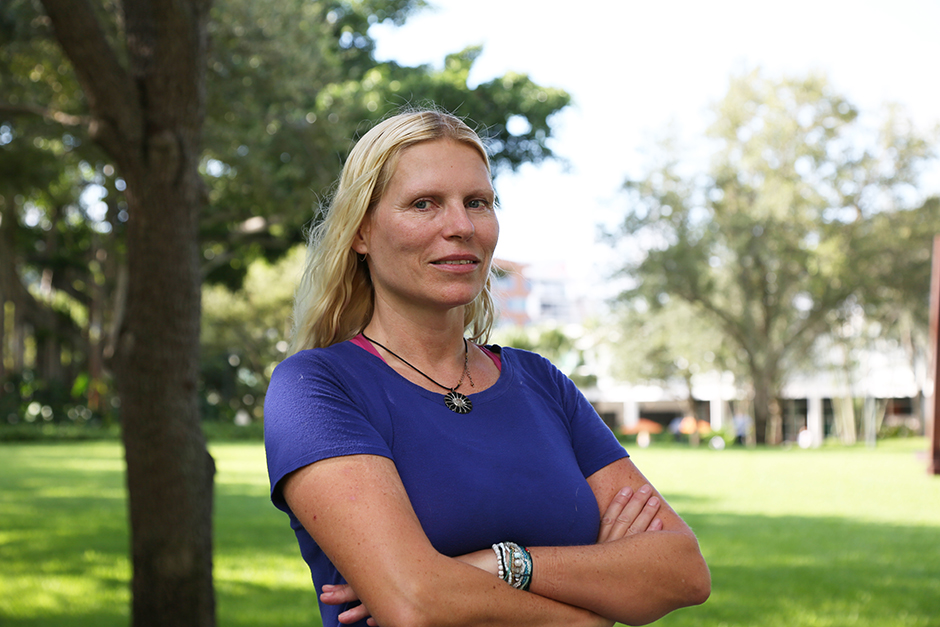Philosophy Professor Berit “Brit” Brogaard is Director of the Brogaard Lab and was recently named an A&S Cooper Fellow, which is a three-year appointment that includes an annual research fund of $15,000. Cooper Fellows are chosen based on excellence in contributing to the University's core missions of scholarship, teaching, and service.
Brogaard's areas of research include philosophy of perception, philosophy of emotions, and philosophy of language. She is the author of Transient Truths (Oxford University Press, 2012), On Romantic Love (Oxford University Press, 2015), The Superhuman Mind (Penguin, 2015), and Seeing & Saying (Oxford University Press, 2018).
A&S News: Your research focuses on the philosophy of perception, emotions, and language. What inspired your interest in these areas and what is their relationship to philosophy?
Brogaard: My first degree was actually in cognitive neuroscience. I was interested in consciousness and the brain from an early age. After I finished my neuroscience degree, I decided to do philosophy. My interests in emotions and consciousness actually date back to my time working in a neuro lab in the Danish National Hospital, and I became increasingly more interested in perception during my postdoc in Australia in mid-2000. It was around that time that I began to dedicate more time to synesthesia, a condition where perceptual channels that are normally distinct get connected either directly or indirectly. What I find really fascinating about perception, language, and emotions is that they are so central to human life, function, and well-being.
A&S News: Who are your favorite philosophers?
Brogaard: Historically speaking, I would say Bertrand Russell and William James. There are many others, but I have probably learned most from the latter two, perhaps because I read them very early on. Of course, they belong to recent history. Going further back, I must admit that I am a big fan of the German philosopher Immanuel Kant, and of course the Ancient Greek philosophers Plato and Aristotle. I should also mention that I love reading Søren Kierkegaard, the great Danish existentialist.
A&S News: What big projects are you working on now?
Brogaard: One of my big projects right now is a longitudinal study of perception, cognitive abilities, and language development in so-called "feral children." I am in contact with the parents of a group of children who spent the first three to five years of their lives in a cage. Once I get the ethics approval, I will be spending quite a bit of my time on that project.
A second project that I hope to start soon is to look closer at the cerebellum—a part of the brain that traditionally was largely ignored in research. But when I went to Thomas Alrik Sørensen's lab to learn some new techniques and collaborate on some projects this past June, I learned that it probably plays a far greater role than hitherto thought. It appears to be crucially involved not only in the coordination of action but also in sensory perception, memory, and consciousness. Finally, I am still investigating synesthesia and savant syndrome, especially the kinds that are acquired after brain injury or disease.
A&S News: You were recently recognized as a Cooper Fellow, one of the highest honors in the College of Arts & Sciences, what does this recognition mean to you?
Brogaard: I was speechless and surprised (literally) when I heard my name called at the reception. I am so very honored by this recognition. It has motivated me in a new way and has also given me the courage to think much more outside the box (to use a cliche).
A&S News: What’s your teaching style like and how has it changed throughout the years?
Brogaard: My teaching style has definitely changed over the past 19 years. I find it easier to connect with students and make them laugh, although sometimes they will just give you the incredulous stare. But I think I am starting to get a better understanding of how to make learning a lot of fun (and when learning is a lot of fun, so is teaching).

